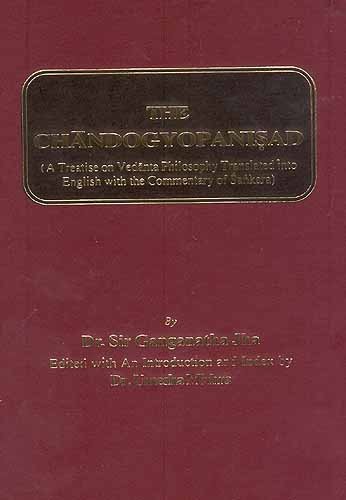Chandogya Upanishad (Shankara Bhashya)
by Ganganatha Jha | 1942 | 149,749 words | ISBN-10: 8170842840 | ISBN-13: 9788170842842
This is the English translation of the Chandogya Upanishad, an ancient philosophical text originally written in Sanksrit and dating to at least the 8th century BCE. Having eight chapters (adhyayas) and many sub-sections (khandas), this text is counted among the largest of it's kind. The Chandogya Upanishad, being connected to the Samaveda, represen...
Section 7.13 (thirteenth khaṇḍa) (two texts)
Upaniṣad text:
‘Memory is greater than Ākāśa. Therefore, even when there would be many persons,—if they had no Memory,—they could not hear any one, they could not think, they could not know; if they had Memory, they could hear, they could think, they could know. It is by Memory that one knows his son, and it is by Memory that one knows his cattle,—Meditate upon Memory.’—(1)
‘One who meditates upon Memory as Brahman becomes free to act as he wishes in the sphere within reach of Memory.’—‘Revered sir, is there anything greater than Memory?’—‘Certainly, there is something greater than Memory.’—‘Please explain that to me, Revered sir.’—(2)
Commentary (Śaṅkara Bhāṣya):
Memory is greater than Ākāśa.—‘Smara’ stands for ‘smaraṇa’,—the faculty of remembering, belonging to the internal organ. This faculty of Memory is greater than Ākāśa; ‘bhūyaḥ’ (neuter form) being taken as standing for ‘bhūyān’, masculine form. It is only when the man remembers things that all objects, Ākāśa and the rest,—have their use; as it is only then that they can be objects of experience; when one does not remember things, even what exists is as good as not existent; as it does not perform the functions of a really existing thing. Nor is it possible to apprehend the reality of Ākāśa and the other things, if there is no remembrance. Thus, it is that Memory is greater than Ākāśa. Inasmuch as this greatness of Memory is realised in the world,—even if many persons would be assembled and seated in any one place,—if they happened to have no Memory,—they could not hear any one of them speaking,—similarly, they could not think, because of want of remembrance,—and they could not know. If, on the other hand, they had Memory, they could hear what is to be heard, think of which is to be thought of and know what is to be known. It is by Memory that one knows his sons.—‘These are my sons’;—and it is by Memory that one knows his cattle.—Hence, on account of its being greater (than Ākāśa),—meditate upon Memory.—The rest has been already explained.—(1-2)
End of Section (13) of Discourse VII.
